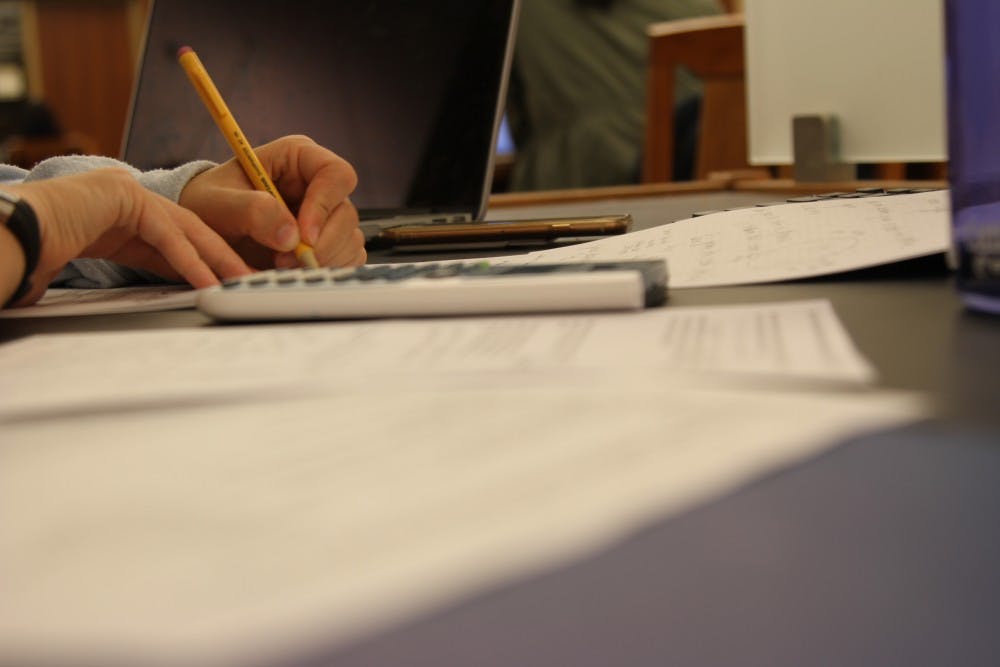In a show of understanding of the challenges students face because of online learning, some professors are letting students off the hook for their final exams.
Professors from multiple departments have altered aspects of students’ final grades in the wake of Duke’s move to online classes. For some, this has meant changing or outright canceling final exams.
“Finals are a good opportunity to review material and make connections between different sections of the course,” said Victoria Akin, assistant professor of the practice of mathematics and instructor for a second-semester introductory calculus class. “But we also wanted to balance that out against the burden of trying to take an exam during a global pandemic.”
The changes are especially evident in the mathematics department, whose classes typically administer three-hour in-person cumulative finals. Although some professors wanted to continue to offer the final, there were too many obstacles that would have stopped students from being fairly and accurately tested, according to professors within the department.
“For two or three weeks I was thinking so hard about how to do it and do it right so it would be fair to the students. But after realizing all the issues, I finally just gave it up,” said Lewis Blake, associate professor of the practice emeritus of mathematics, who currently teaches a lecture course in introductory calculus.
Despite never having taught an online class before, Blake is making strides to replicate the classroom environment over Zoom, encouraging students to turn on their videos and participate in the class like normal.
However, everything is not normal. After giving one practice multiple-choice exam, Blake quickly discovered that online testing is far more difficult than exams held in the classroom.
Classes were sometimes cut short or interrupted by connectivity issues. When questions arose, he couldn’t clarify and write corrections on the board. One student’s internet went out just after a test began, and the student automatically received a zero.
With students scattered far and wide, Blake said that offering a test that was fair to students and accurately graded no longer seemed feasible. Beyond time zone differences, challenges included some students’ lack of access to printers or reliable internet connection.
Even though the cumulative final was canceled, the third midterm—supposed to take place after on-campus classes were canceled—covered all but the last two lessons, so students would nonetheless be tested on almost all of the course material, Blake said.
First-year Philippe Izedian wasn’t upset about missing the cumulative final in his calculus class, taught by Research Professor of Mathematics Dorothy Buck. He’s grateful for how his professor has been handling the transition to online learning.
“[Buck] is the best,” Izedian said. “From the moment Duke canceled classes, she has been sending updates on the mathematics department. We’ve been kept in the loop the whole time.”
Although the grading system was revised to compensate for the lack of a final, Izedian did not feel that students’ grades would suffer from that change.
“A lot of people told me to be worried about Duke math,” Izedian said. “But so far my experience in this unprecedented situation has been amazing. The professors are trying to be student-friendly and taking into account different situations.”
Clark Bray, associate professor of the practice of mathematics, confirmed in an email that the final for the course he teaches in linear algebra and differential equations was canceled. His reasoning was similar to other professors who made the same decision.
“I had several concerns—student stress and exam security were the obvious ones,” Bray wrote. “But I was also concerned that, with likely very many students on the [Satisfactory/Unsatisfactory] basis, the score distribution might be skewed significantly in a way that we would not be able to understand precisely and with confidence; that would make it harder to interpret the scores of the students.”
Akin didn’t want to remove her final entirely because of its importance to students who needed to understand the material for future classes.
She originally expected to give students a cumulative final worth 30% of their grade. Now, she is conducting a non-cumulative exam. Students who wish to take the course pass/fail can opt out of the final and receive a grade of C-, which would be a passing grade.
This way, she said, instructors can “encourage the same thinking while alleviating the stress.”
Moving forward, Akin said there is an ongoing conversation within the mathematics department about grading. Ultimately, she wants to find a method of assessment that gives students multiple opportunities to show that they understand the material, which may not be simply through exams.
Changes to final exams are not exclusive to the mathematics department. Professor of Chemistry Steven Baldwin substituted the class’s final for a fourth non-cumulative exam that covers the last of the course material.
The class doesn’t always have a cumulative final—the decision is typically left to the instructor’s discretion. But after the University’s sweeping changes due to COVID-19, Baldwin said, the decision was obvious. Distance learning creates issues for the instructor as well as students, he said. He would normally gather his TAs in a room to grade, but that is no longer an option.
“There are over 200 students in the class. I can’t grade 200 18-page exams by myself. I’d be grading exams for two months,” Baldwin said.
For online exams, which are open book, Baldwin is reconfiguring the questions so the answers cannot be easily found in the textbook. Since this course is foundational for many future classes, he wanted to make sure that students were able to tie concepts together and look at the big-picture themes of the course.
Once everyone returns to campus, Baldwin said he will use his newfound online-learning skills to add more opportunities for students to connect with him and others online.
At the Sanford School, finals are suffering the same fate. Sandeep Bhattacharya, senior lecturing fellow in Sanford, teaches Economics of the Public Sector, a course cross-listed under the economics and public policy departments. He said students report a lot of stress around the time of the final exam, and he canceled the final to reduce anxiety for both the students and the graduate teaching assistants.
“My main motivation is to try and reduce the stress on students,” Bhattacharya said.
With the sudden transition to online learning, there was no time for the class to be reconfigured from its original in-person format. The class wasn’t designed to be online, and neither was the final.
“Given that other classes are doing exams, do I want to do the same thing or do I want to try and help students if I can?” he said.
Get The Chronicle straight to your inbox
Signup for our weekly newsletter. Cancel at any time.

Maria Morrison is a Trinity senior and a digital strategy director for The Chronicle's 117th volume. She was previously managing editor for Volume 116.

